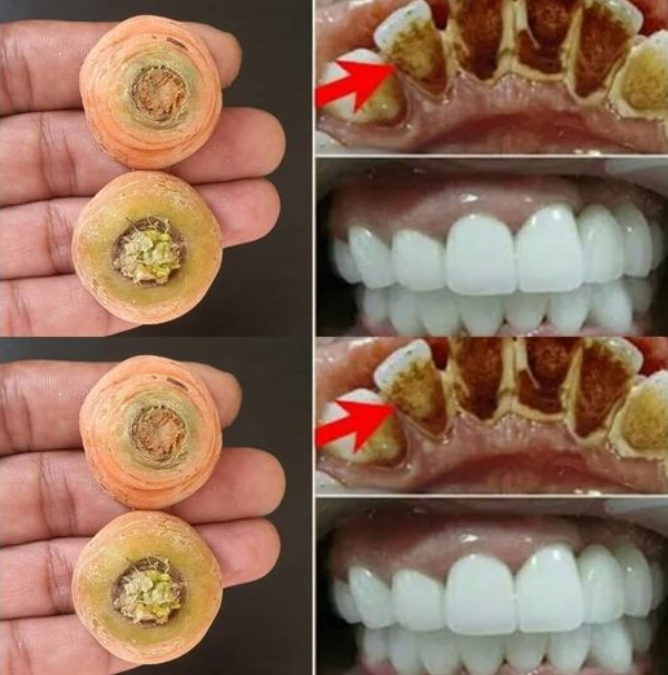In recent years, many people have turned to natural home remedies for teeth whitening as a safer, more affordable alternative to commercial products. Among the various DIY options available, a simple combination of carrot and lemon has gained attention for its potential benefits. Not only are these ingredients easily accessible, but they also offer a natural and gentle way to brighten your smile. Here’s everything you need to know about using carrot and lemon toothpaste for teeth whitening.
Why Use Carrot and Lemon for Teeth Whitening?
Carrot and lemon might seem like an unusual combination for oral care, but both ingredients possess properties that can contribute to healthier and whiter teeth.
- Carrot: Carrots are rich in fiber and natural abrasives that help scrub away plaque and food particles from teeth. They stimulate saliva production, which acts as a natural cleaner for your mouth. Additionally, carrots are packed with essential vitamins, such as vitamin A, which is vital for strengthening tooth enamel.
- Lemon: Lemons are known for their high concentration of vitamin C and citric acid. The acidity of lemon juice acts as a mild bleaching agent that can help lighten surface stains on your teeth. However, it is crucial to use lemon juice carefully, as excessive use can erode tooth enamel due to its acidity.
How to Make Carrot and Lemon Toothpaste
To create your homemade carrot and lemon toothpaste, you’ll need just a few ingredients, most of which are likely already in your kitchen. Here’s a simple recipe:
Ingredients :
- 1 medium-sized carrot, grated
- 1 teaspoon of freshly squeezed lemon juice
- A pinch of baking soda (optional, for extra whitening power)
- 1 teaspoon of coconut oil (optional, for antibacterial benefits)
Instructions :
- Grate the Carrot: Grate the carrot finely to make it easier to mix and apply to your teeth.
- Mix in the Lemon Juice: Add the freshly squeezed lemon juice to the grated carrot. Stir the mixture until it forms a paste-like consistency.
- Optional Ingredients: If you want extra whitening power, you can add a small pinch of baking soda. Be careful not to use too much, as baking soda can be abrasive to enamel. Coconut oil can also be added for its antimicrobial properties, helping reduce harmful bacteria in the mouth.
- Brush: Apply the paste to your toothbrush and brush your teeth as you normally would. Make sure to brush gently to avoid damaging your enamel.
- Rinse: After brushing, rinse your mouth thoroughly with water.
Benefits of This Natural Remedy
- Natural Whitening: The combination of carrots and lemon juice offers a natural way to brighten your teeth without exposing them to harsh chemicals often found in commercial whitening products.
- Nutrient-Rich: Carrots contain vitamins and minerals that can help strengthen teeth and improve overall oral health. Vitamin A, in particular, plays a role in the production of saliva, which is crucial for keeping your teeth clean.
- Affordable and Accessible: Unlike store-bought whitening products that can be expensive, this remedy uses ingredients that are cheap and easy to find.
- Safe for Daily Use (With Precautions): As long as you don’t overuse the lemon juice, which is acidic and can erode enamel, this paste can be used a few times a week to maintain a brighter smile.
Things to Consider
While this natural remedy can be effective for surface stains, it’s essential to remember that it won’t work as quickly or as dramatically as professional treatments. Also, the acid in lemon juice can damage tooth enamel if used too frequently. It’s advisable to limit use to 2-3 times a week and always rinse your mouth with water afterward to neutralize the acid.
Conclusion
Carrot and lemon toothpaste is an excellent option for those looking for a natural and gentle way to brighten their smile. While it may not replace professional whitening treatments, it offers a safe, accessible, and chemical-free alternative for minor surface stains. By using this remedy in moderation and maintaining good oral hygiene habits, you can enjoy healthier, whiter teeth naturally.
Be sure to consult with your dentist before starting any new oral care regimen, especially if you have sensitive teeth or gum issues.
